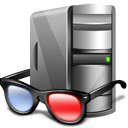 Process Explorer Process Explorer |
Provides all the process details that Windows Task Manager does not. |
Actually one of the many “SysInternals” tools provided by Microsoft (as noted below). |
 Sysinternals Sysinternals |
Around 70 Windows utilities intended mostly for tweaking and examining various parts of the operating system. |
Mostly written by Mark Russinovich - a professional hacker who Microsoft “brought inside” when they bought his company in 2006. |
 Frhed Frhed |
Free Hex Editor is a simple tool that allows you to view and edit every bit inside any file. |
Even big files that might not fit in memory can be partially loaded and viewed/edited |
 |
Runs a comprehensive test of a system’s memory and Northbridge chip. (bootable CD) |
Excellent for testing a new PC’s memory before trusting it with data. Also good for debugging a PC that’s starting to act flaky. |
 Speccy Speccy |
Describes everything about your computer hardware that software can possibly discover - including details about memory, CPU, graphics, storage, and motherboard components. |
Written by the same people that make really good disk tools: Piriform. |
 Wireshark Wireshark |
One of the most popular packet sniffing and protocol analysis tools available. Can also view wireless traffic if your WiFi adapter can be put in "monitor" mode. |
Since Ethernet switches have mostly replaced hubs, sniffing won’t be very interesting until you setup port mirroring on your switches. Dedicated remote "packet capture" hosts can also be monitored by a central console. |
 Fing Fing |
This network tool discovers all devices connected to your local wired and wireless networks. Attempts are made to identify each device based on protocol responses and MAC addresses. |
Particularly useful when assigning static IP addresses and you don't already have a good device inventory. |
 Ultimate Boot CD Ultimate Boot CD |
This bootable ISO image, also refered to as “UBCD”, has a pile of disk and other utilities available from a startup menu. This includes a good number of utilities described above - but only the non-windows ones. |
If you’re allowed to take one disk to a desert island covered with broken PC's, this is it. Incidentally, UBCD can be started from a USB thumb drive as well. |
 HP-16c HP-16c |
While not an official HP product, this emulator is a very close HP-16c workalike. Although the actual calculator was discontinued in 1989, it is still popular with programmers. |
This is the calculator I should have had in college - and regret that it was discontined the year I graduated (when I finally realized how useful it was). Incidentally, a third-party, credit-card-sized reproduction is now available here. |
 Sysinternals
Sysinternals Frhed
Frhed
 Wireshark
Wireshark